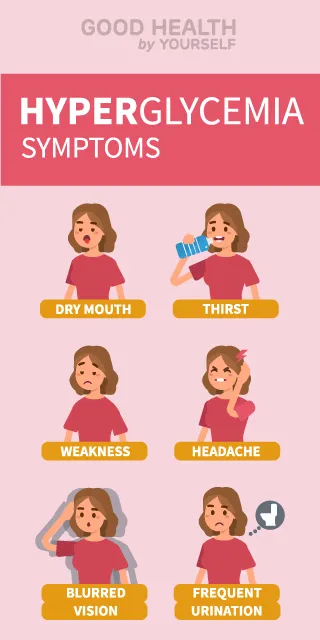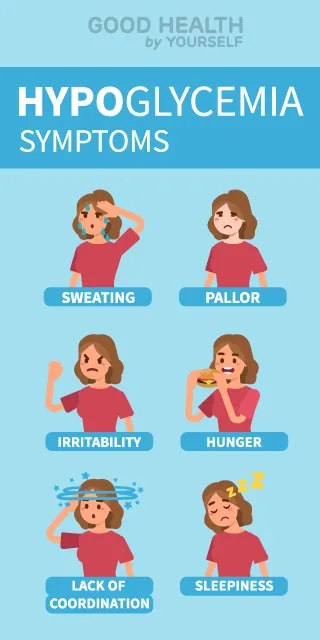Diabetes & Mood Swings: How Blood Sugar Level Affects Mood
Key Highlights
- Mood swings due to diabetes are common and could strain relationships and affect mental health.
- Poor diabetes management is the root cause of blood glucose swings.
- Accurate understanding can help cope with this condition.
- Seeking professional help and following the prescribed treatment plan can help cope with the mood swings.
Before looking at how diabetes causes mood swings, it is important to understand what diabetes is and how it affects the body.
Diabetes is a chronic condition that impacts your body physically and mentally. It weakens the body's ability to use glucose and control its levels. When blood glucose levels shoot up, you feel happy or excited, whereas a drop in the levels can make you feel tired and grumpy.
In diabetes, changes in mood are more frequent than usual. Diabetic mood swings are characterized by a steep increase or decrease in blood sugar levels, directly affecting your mood and the body's functioning.
Variations in blood sugar levels can contribute to rapid changes in mood, and it can get very stressful to manage. This may put an unhealthy strain on relationships. Does your partner complain that you are an irritable spouse? Well, this may be the reason!
Signs of mood swings
Let's list out a few signs of mood swings:
- Getting super irritable when hungry
- Sudden grumpiness
- Showing grouchy emotions or erratic behavior
- Anger outbursts after drinking alcohol
- Exercise-induced anger
The above list is just an example of the range of emotions you may show if you have diabetes and its associated mood swings.
Controlling diabetes is a challenging task in itself. The mood swings and having hyperglycemic or hypoglycemic episodes can make it difficult to control emotions sometimes, which in turn could lead to anxiety and depression.

These factors can be challenging to navigate and may strain relationships. But learning about these factors can help the affected person and those around them build stronger, healthier relationships.

Managing diabetes can become overwhelming on a daily basis; hence it is imperative to check your emotional wellbeing regularly.
An excellent way to start regulating it is to carefully understand and follow your diabetes management plan.
This will help smooth out the highs and lows in your blood glucose levels and maintain good mental health. If you're experiencing burnout, anxiety, or depression symptoms, consider talking to a mental health professional.
Importance of understanding and controlling mood swings
Mood swings and Diabetes
Variations in blood sugar impact your feelings and can contribute to mood swings. Poor blood glucose management can increase those negative moods and worsen your quality of life.
But, how do you know if your blood glucose is high or low? Well, your diabetes management plan should involve checking blood glucose frequently to help manage the condition.
The American Diabetes Association (ADA) states that the ideal target range for blood sugar can vary for each person. However, it usually lies between:
- 80 to 130 milligrams per deciliter (ml/dl) before eating a meal
- 180 ml/dl or lower a few hours after eating a meal
You may have noticed that you are erratic when your blood sugar is high or low. But, when you start maintaining a normal blood glucose level, you immediately feel better. You may also see a trend of different emotions when the blood glucose is swaying left and right. So, you must test your sugar levels when you experience unusual emotions emotions.
- When the blood glucose gets low, you could feel: confused, hungry, nervous, irritable, jittery, shaky, tired, and sweaty.
- And, when the blood glucose levels rise, you may feel: angry, tense, sad, faint, brain fog, thirsty, nervous, tired, nervous, and lethargic.
If you are on insulin or a sulfonylurea regimen, keep a fast-acting carbohydrate source with you all the time. This is particularly helpful when your blood glucose is suddenly below the normal range.
Examples of these sources are fruit juice, glucose tablets, candies or gel, and regular (not diet) soda.
If you experience significant fluctuations throughout the day, talk to your doctor about changes in your treatment regimen.
Stress and diabetes
Diagnosing diabetes and managing it over time can be huge stressors for your emotions, often overwhelming you. This is also called diabetes burnout.
Here are some reasons why you may feel stressed:
- Not feeling physically well
- Being concerned about the diabetes management plan, including how it is going to affect your daily life, lifestyle modifications, and the extra costs
- Feeling overwhelmed about taking medicines for the rest of your life
- Feeling exhausted from sticking to your management plan
Such feelings can affect diabetes management negatively, and if this lasts for a long time, it can lead to dangerously high glucose levels. Stress can elevate or cause a sharp fall in your blood glucose levels. These fluctuations can change your overall mood.
Stress also affects your daily life. For example, when under stress, you may feel less motivated to exercise, eat and drink healthy food as per your treatment plan. Whenever you feel stressed, it is best advised to talk to your doctor about this or reach out to a diabetes educator.
Mental Health and Diabetes
Diabetes can increase your risk of developing mental health conditions. For example, anxiety is common in people with diabetes, especially women. Reports suggest that 30 to 40% of people with diabetes have anxiety and up to 1 in 4 have depression.
Common symptoms of depression include anger, anxiety, changes in sleep patterns, low quality of life, poor lifestyle choices, difficulty concentrating, weight gain or loss, tiredness, or lethargy.
Depression can make the management of diabetes difficult. Infact, the highs and lows that you experience with poor diabetes management can lead to varying changes in mood and may worsen the symptoms as well.
It is highly recommended to see a mental health professional to discuss the possibility of depression or other mental health conditions due to your diabetes.
Take recommendations from your friends and family members or inquire about mental health provisions from your insurance provider.8 Find a suitable agency or provider in your country, such as the National Alliance on Mental Illness, to help cope with the illness.
How to cope with the mood swings
Learning about diabetes and its effects on mental health can be concerning. Well, we've got you covered!
Here's how you can keep your blood glucose levels and mood swings under check:
Follow your diabetes treatment plan
Continue to follow the treatment plan prescribed by your doctor diligently. Your plan may likely include daily medications, blood glucose screenings, and some lifestyle adjustments.
Monitor blood sugar regularly
Record and monitor your high and low blood glucose readings. Report any unusual readings to your doctor, if needed, to help understand the possible cause behind them. Try blood sugar management methods when your blood sugar readings stray from the normal range.

Automate the treatment
Use reminders on your smartphone or use an application to take your medications, track your medication intake and check your blood sugar regularly. This will prevent any missed dosage issues while keeping your blood sugar levels steady.
Maintain a healthy diet and plan your meals
With diabetes, it becomes even more critical to maintain a healthy, balanced diet. Try making a list of your favorite diabetes-friendly meals of the week, and use this list to shop for groceries. It may be a good idea to prep your food in advance, if it helps follow your diet plan when you have a hectic work during the week.
Ask for help
Dealing with diabetes alone can be stressful, and managing it can be even more challenging. Some circumstances may make it difficult for you to follow your treatment plan. However, here are some ways that may be helpful:
- Get assistance from your doctor
- Consult a diabetes educator
- Join a support group
- Lean on some insights from family and friends to help support your needs
- Sign up for a 'managing diabetes' class
Conclusion
It is common to encounter mood swings due to blood glucose fluctuations or blood glucose swings in people with uncontrolled diabetes. However, the most important thing is understanding how blood sugar level affects mood and finding suitable and effective ways to cope with these changes.
Apart from standard diabetes management methods, you can also try herbal teas to help yourself or someone manage their anger. If you need to know more about managing your mood while dealing with diabetes, explore the sources below.
Did you like our Article?
Excited
0
Happy
0
Not Sure
0
Silly
0
- Shrimali, R., & Mehta, M. (2018). Mood fluctuations and coping pattern among diabetic patients. IAHRW International Journal of Social Sciences Review, 6(7), 1278-1283.
- Hermanns, N., Ehrmann, D., Finke‐Groene, K., & Kulzer, B. (2020). Trends in diabetes self‐management education: where are we coming from and where are we going? A narrative review. Diabetic Medicine, 37(3), 436-447.
- Dellafiore, F., Rosa, D., Pittella, F., Caruso, M. P., Allemano, M., & Caruso, R. (2018). The impact of type 2 diabetes diagnosis on married couples. Journal of Diabetes Nursing, 22(2).
- Robinson, D. J., Coons, M., Haensel, H., Vallis, M., & Yale, J. F. (2018). Diabetes and mental health. Canadian journal of diabetes, 42, S130-S141.
- American Diabetes Association. (2013). Standards of medical care for patients with diabetes mellitus. Puerto Rico Health Sciences Journal, 20(2).
- Nash, J. (2013). Diabetes and wellbeing: managing the psychological and emotional challenges of diabetes types 1 and 2. John Wiley & Sons.
- Yale, J. F., Paty, B., & Senior, P. A. (2018). Hypoglycemia. Canadian journal of diabetes, 42, S104-S108.
- Penckofer, S., Quinn, L., Byrn, M., Ferrans, C., Miller, M., & Strange, P. (2012). Does glycemic variability impact mood and quality of life?. Diabetes technology & therapeutics, 14(4), 303-310.
- Chu, B., Marwaha, K., Sanvictores, T., & Ayers, D. (2021). Physiology, stress reaction. In StatPearls [Internet]. StatPearls Publishing.
- Getch, Y., Bhukhanwala, F., & Neuharth-Pritchett, S. (2007). Strategies for helping children with diabetes in elementary and middle schools. Teaching exceptional children, 39(3), 46-51.
Our team of experts frequently monitors developments in the health and wellness field, and we update our articles when new information becomes available.
Current Version
Feb, 29 2024
Written By
GHBY Team
Dec, 01 2023
Written By
GHBY Team
Leave a Comment